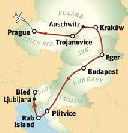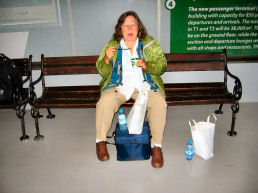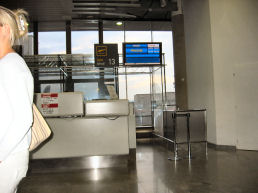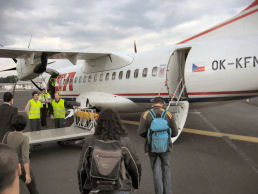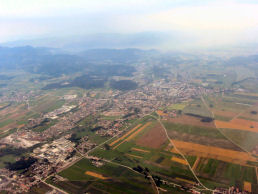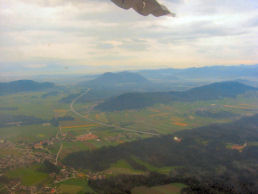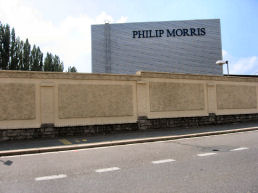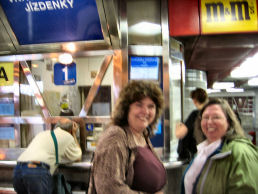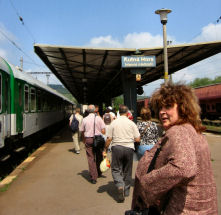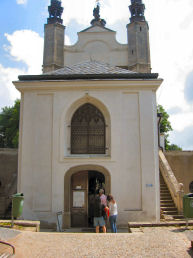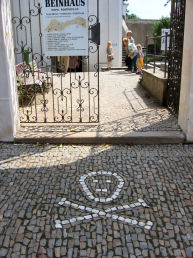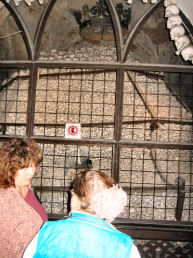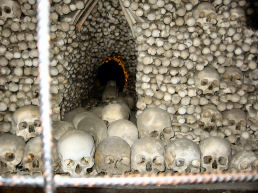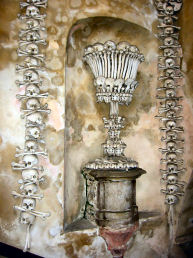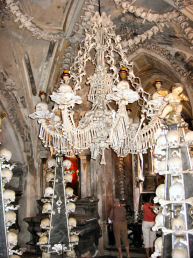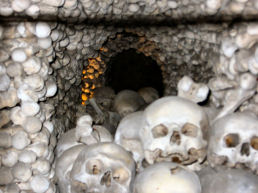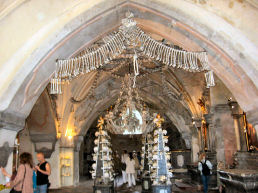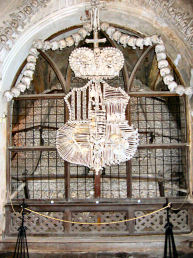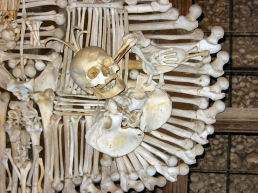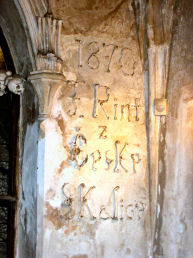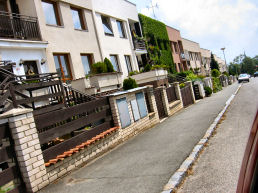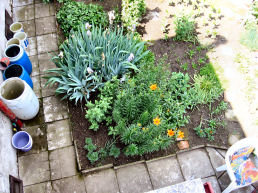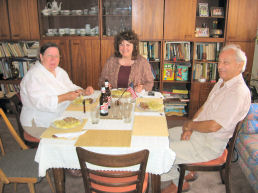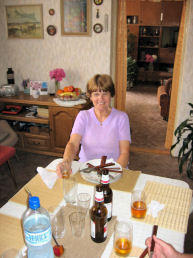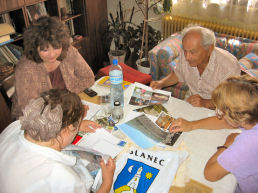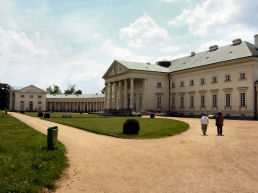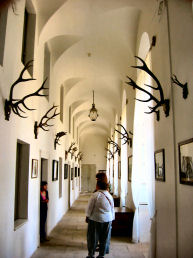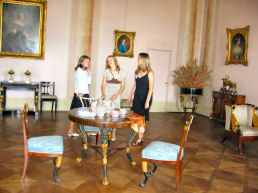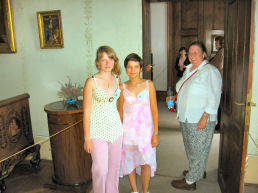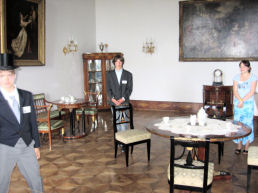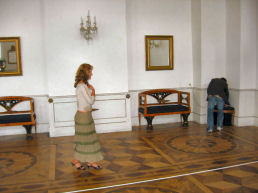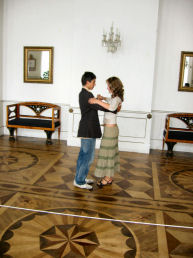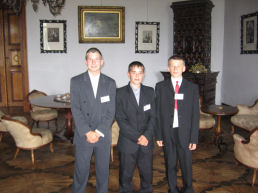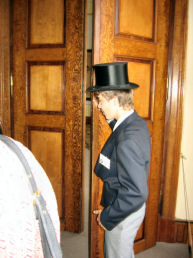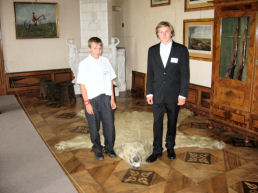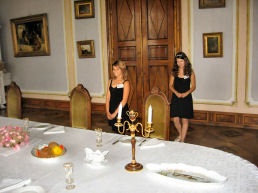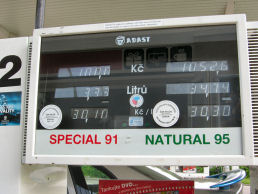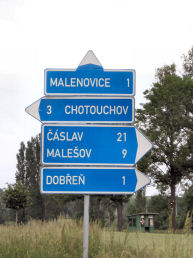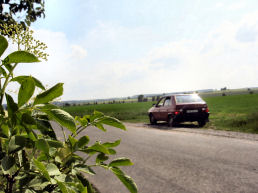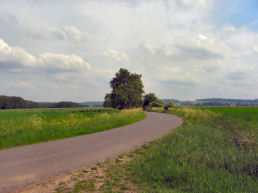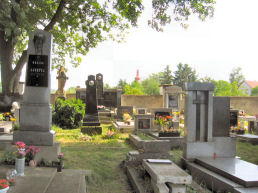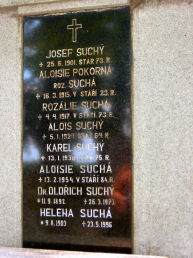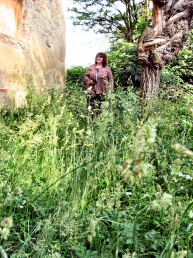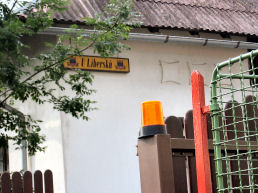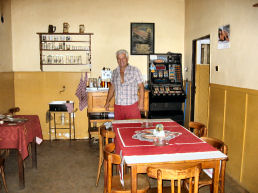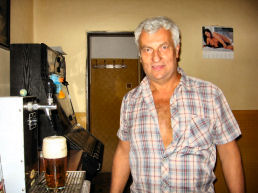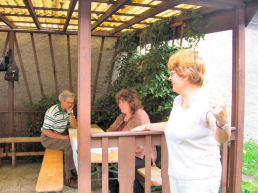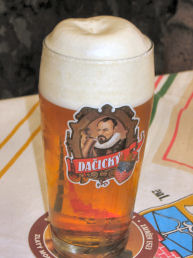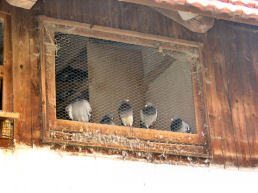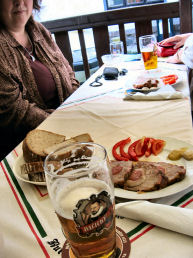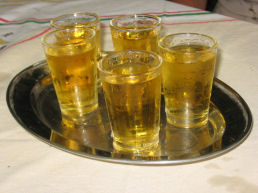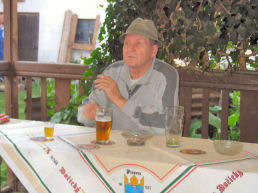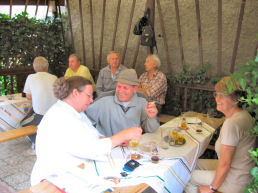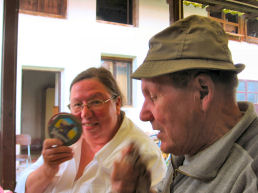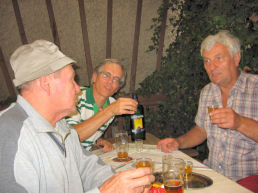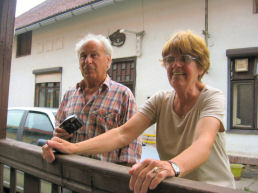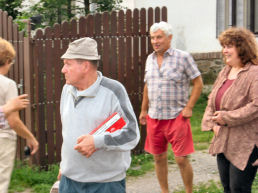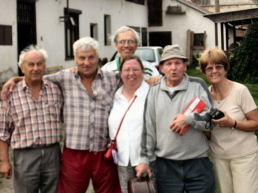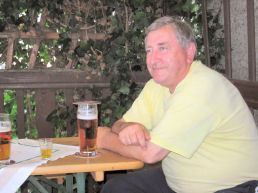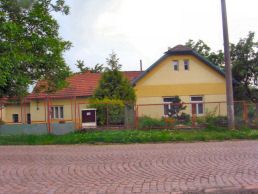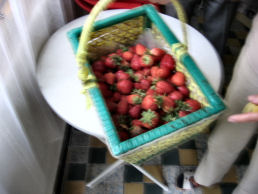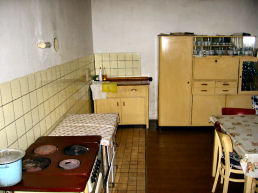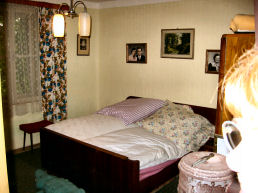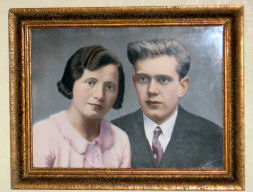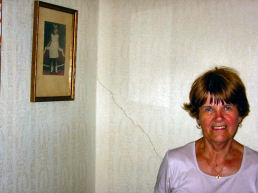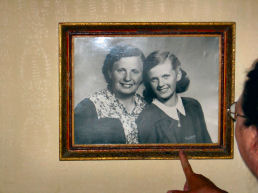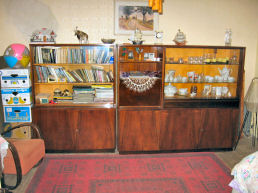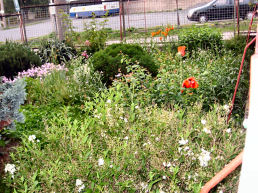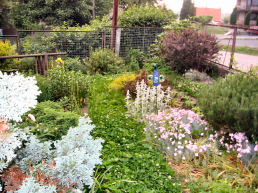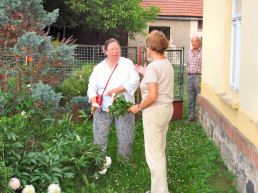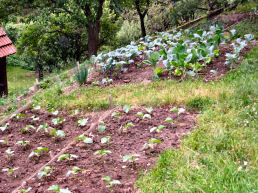I was awake from about 2:45 until four. I don't know why I had such trouble sleeping on this trip; this difficulty had never surfaced on any other trips. I customarily suffered through one day of jet lag, and then I was fine.
At four I got up and shaved so that Sue could have as much time as she needed in the bathroom to get ready. The wake-up call came at 4:15. Sue was a little irked that she had to crawl across the bed to answer the phone.
We made it down to reception at ten minutes before five. By the time that we had turned in our keys and our Ethernet cable and picked up our breakfast bags at the hotel desk, the driver had appeared. I did not notice what make of car he drove, but it was quite nice. Our bags easily fit in the trunk, and we rode comfortably in the back seat.
The driver made unbelievable time to the Aerodrom Ljubljana located in the town known as Brnik, which is between Bled and Ljubljana. We encountered little traffic, and we zoomed past all the other vehicles. Sue and I did not expect to reach the airport before 5:30, but my watch said 5:17 when we arrived. The driver helped us unload our stuff, and then he was off. We did not have to pay him because Susana had collected our money beforehand and made all the arrangements.
We entered the terminal and found no one in line at the ČSA counters. By the time that we had finished checking in, there was a long line.We went back outside to consume the liquids and gels in our breakfast bags. We found an empty bench and set up camp. Sue produced the plastic silverware that Brian Corcoran had bought for her. The yogurt was so horrible that I could not stomach it. Sue good-heartedly traded me a flavored yogurt that she had hoarded from somewhere. She forced down a few spoonfuls of the horrible hotel yogurt. My banana was quite bruised. Sue traded with me. I don't know why she was so generous, but I gulped down her banana. I then drank half of my water and threw the rest away. Sue hates to throw anything out. It pained her to chuck her water bottle, even though it was empty.
While we sat on the bench, a policeman went by. An automatic rifle was strapped tightly across his back. We never did figure out what that was about.
In the airport Slovenian security was not very severe. They made me take off my belt but not my shoes. I wondered whether they were crazy, stupid, or just incredibly naďve. People, there is a war on. What if some dastard followed Richard Reid's example and set fire to his shoes?
The airport was very small. There were far too few seats for all of the people waiting in the area near gates 9-13. We sat on a marble planter or something. It was tolerable for a few minutes, but no one would want to be stuck there for hours. Everyone on our flight had to board a small bus that took us from gate #13 to our plane. We had chuckled to ourselves at the yokels in the terminal who were flying on Adria Airlines while we took the Czech national airlines, a member of the Sky Team. Who even had heard of Adria? However, as our bus approached the only prop plane on the runway, and we saw the ČSA logo on it, we changed our tune.Because I was such a big man at Delta Airlines, and ČSA was a partner, Sue and I were upgraded to "business class." Our upgrade moved us from seats in row 3 to the equivalent seats in the eleventh of twelve rows. Six-inch curtains on the back of the seats in row 10 demarcated the business class. In other respects the seats seemed identical. The seats in row 12 probably did not recline; the ones in the last row are usually rigid. The seat used by the guy in front of Sue would not stay in the upright position. He kept falling back into her lap.
Our preferential treatment in business class primarily consisted of hot wet towels before breakfast and tablecloths on our trays. We were served some prosciutto and some cheese with bread of our choice. We also got coffee. The flight attendants in economy class handed out sandwiches in plastic wrap, and allowed each passenger a drink. In business class we got seconds on coffee; the peasantry might have been limited to one beverage.The breakfast on the plane was hearty enough that we were not tempted to dip further into our breakfast bags from the hotel. Each still contained an orange, a ham sandwich, and a breakfast pastry that looked quite inviting.
Announcements on the plane were made in Czech and English. They have really made it easy on Englishmen and Americans. I wondered what tourists from other countries thought about this favoritism. A very large number of Germans, French, and Italians travel. Most of Latin America speaks Spanish. Brazil and Portugal must be close to as populous as the U.S. and Great Britain. [Actually no. They only have about 55 percent, 200 v. 360 million.]I managed to get some pretty nice photos from the plane of the land around the airport. By the time that we reached Austria, the clouds were solid. So, we went all around and even over Austria on this trip, but we never even got a glimpse of it.
Our landing in Prague was smooth, and passport control in Prague was trivial. The rest of the world seems less paranoid than the U.S. I purchased $200 worth of Czech crowns. The rate was not too good, but at least it was better than the rate that I got the last time that we landed here.
We moseyed over to the baggage claim area. While Sue used the rest room, the buzzer sounded and the warning light on the carousel flashed. Only four bags came up on the conveyor belt; three (the right number) were ours. For once I was not too upset that ours were the last bags to arrive.
Our plan was to meet Jana Liberská at the airport. She was part of Sue's very extended family. Since I was somewhat short on relatives, I considered her part of my family, too. Her husband Jarda's great grandmother was the sister of Sue's great grandmother. Sue and Jana both know the details of quite a few players in between, but I have trouble keeping them straight. For that matter I have trouble keeping my own cousins straight.
The other relatives whom I met were Jarda's father and mother, Zdeněk and Alena. Zdeněk's brother Mirek was younger by seventeen years. In fact, he was much closer in age to Jarda.
Jana worked as translator of documents from English to Czech. The down side of her job was that she is constantly on call. The up side was that she served as a tremendous go-between for us Yankees and the Czechs. Also, she sometimes could manage enough free time to serve as a guide for freeloaders such as ourselves.
Jana showed us the building in which she and Jarda both had worked before they were married.
Zdeněk worked for thirty-five years at a tobacco factory. After the revolution in 1989 it was purchased by Philip Morris. Zdeněk was offered a severance package, and he sensibly accepted it rather than struggle with dealing with a new company and a new language. One thing that we learned in a very personal way on this trip was that the transition from communism to capitalism was a very difficult one for millions of people who had worked for state-owned institutions for many decades.Alena took care of everybody in the family. Jana said that she had helped her a lot with raising her two daughters. Alena could not speak English quite as well as Jana, but she knew enough to get her points across.
We spotted Jana as we left the baggage claim area. Jana and Sue recognized one another immediately. Jana had arranged for a driver to take us to the train station. We waited in the parked car for a long time. Jana got irked. She told us that she would not pay the driver if he did not get us to the train station in time to catch the 10:00 train to Kutná Hora. In fact, we reached the park across the street from the main train station at 9:30. Jana purchased the tickets and then led us across the park and through the station to track #6, where our train was ready for boarding. It has always seemed incredible to me that in European cities there are often trains just sitting there waiting for passengers.We found an empty compartment. I had never ridden in a train configured with compartments. I put the big red bag up on the rack. The other bags we kept on the seat or the floor. Two young ladies joined us at the first stop. They had only day bags. One was reading an English-language guidebook for Prague. The trip was uneventful. We went past Kolín, which Jana told us was home to quite a bit of industry. Most people on the train, including everyone in our compartment, got off in Kutná Hora.
We learned from Jana that the worry about George W. Bush's arrival affecting traffic at the airport was unnecessary. Air Force One landed at the old airport. Our flight landed at the new airport.The trip to Kutná Hora took about an hour. I was surprised when Jana told us that it would have taken at least ninety minutes to drive. She also told us that an automobile trip from Kutná Hora to Prague had taken her sister five hours on Monday. It became evident that the real reason that Jana did not pick us up at the airport was because she does not like to drive in Prague. [We did not blame her.] She later admitted that she never drove in Prague.
Jana's Škoda was parked at the train station. She seemed apologetic that the car was an old one. We assured her that both of us drove our cars for at least 100,000 miles before trading them in. The only serious defect that I noticed in the Škoda was that the back door could only be opened from the outside. The train station in Kutná Hora was quite a distance from the center of town. Fortunately it was quite close to the chapel popularly known as the Ossuary. Jana insisted on paying our admission, and she even sprung for a camera permit for me. At this rate we would be stuck with fistfuls of Czech crowns to convert back into dollars in Atlanta. We would get reamed on the exchange on both ends. Jana, however, refused to listen to this reasoning.The Ossuary, which was designed and executed by an artist named Franz Rint, must be seen to be believed. It is a real church with several real altars, but it is impossible to imagine attending a service in it. Many people would find the place extremely creepy. Everyone's mind would drift in such a bone yard.
We drove past Jana's and Jarda's house. Jana explained that in the Communist days most people built their own houses. They would receive some money from the government if they completed it within a specified period of time. In her case they got it done in three years. Her dwelling was the only one on her block that is covered in ivy. I never got to see the inside of it. Jana then drove us to Zdeněk and Alena's house. They had a very nice spare room with two beds and a balcony that overlooked the small garden in which they grew both flowers and vegetables. They showed us the WC downstairs and the bath room, which was on the other side of the kitchen. Then the five of us sat down in the dining room for a very nice lunch.
Alena fixed a typical Czech meal of roast pork, sauerkraut, and potato dumplings. We also had some Gambrinus beer. It was very tasty. Jana explained that Czech people still ate their largest meal at noon. However, the trend was to take shorter mid-day breaks and have bigger meals in the evening. I asked Jana what she thought of American food. She said something polite but noncommittal. I offered the opinion that European food was superior because it was so much fresher. I suspected that she agreed with me, but she did not want to offend anyone.
After lunch Jana took us to Zámek Kačina, a huge mansion built by the Chotek family, aristocrats of the Hapsburg period. It is the most outstanding example of the Empire style of architecture in all of the Czech Republic. Some young men and ladies put on performances in which they took the parts of the original nineteenth-century family members and their friends. The boys all wore suits, and the girls all wore dresses. They described the features of the room that they were in; the two in the ballroom even danced. They spoke in Czech, of course. Jana translated it into English. The star of the show was a young man in a top hat. Everyone else was somewhat timid in the presentation. He smiled and delivered all of his lines with confidence and verve.
I was quite struck by the fact that the kids had obviously been coached as to what to do with their arms, but, except for the kid in the top hat, they did not seem to know what to do with their feet. No one seemed to know how to stand still. Adolescents have so much energy.
We must have been at their last performance for the day. We saw some of the young actors back in blue jeans and tee shirts hanging around outside of the mansion. Some yelled "bye bye" to us. As we drove away we passed the star as he sped away on his bicycle. He waved, and so did we. I took a picture of him out the back window, but it did not come out very well. Jana stopped to get some gas. The price was 34,74 Kč per liter, which was almost $6.75 per gallon. Jana said that she had never let the car get so low on gasoline. We tried to pay for the gas, but she would not let us. She even bought us ice cream cones.
We then drove to the village of Chotouchov. Sue tried to say the name about twenty times. Each time Jana corrected her pronunciation. We stopped for a few minutes at a World War I memorial. We could not find the town's cemetery, so Jana asked a lady who was walking her dog where the cemetery was. The lady evidently said that Chotouchov did not have a cemetery of its own. Instead they used the cemetery in the next village. I did not record its name, and Sue did not repeat it dozens of times to aid my memory.
We drove to that other village and found the cemetery. We were supposed to be looking for Volovkas or Suchýs. No Volovkas were to be found. Jana found a Suchý gravestone, but she did not think that they were close relatives of the people Sue was looking for. I found a tombstone for a family named Černych. This is pretty close to my mother's maiden name of Cernech, but I was almost positive that her name was Croatian.
Then we stopped at rundown church. Jana, who really has a nose for this kind of thing, found a few graves, but most of the lot was completely overgrown. She found a sign that disclosed that they still have services once a month.
At this point Jana drove us back to Zdeněk and Alena's house. Sue and I rode in their car to the mysterious establishment known as "Mirek's pub." It is not really a pub any more. Before the Czech Republic joined the European Union, Mirek ran it as either U Libersků or U Kanečka (there were two signs on the wall). Jana told us that he was either unwilling or unable to bring it up to the standards mandated by the E.U. Now he just serves drinks and food to his relatives and friends. I am not certain of any of this, and after Šarka's warning about Czech sensibility to prying in matters of employment, I did not ask any questions.
Mirek also raised homing pigeons. We could see quite a few of them. We sat down outside in an area with one empty table and one occupied by a couple of Mirek's friends. We were also accompanied by a dozen or two large slow-moving flies.
As soon as we showed up, Mirek served us each a half liter of Dačiský beer. Jana and Alena had cokes. Not long thereafter Mirek brought Sue and me some smoked pork with little sausages, tomatoes, peppers, bread, mustard, and horseradish. This seemed strange, but a few minutes later Mirek brought out food for the rest of the people. Our meat was dry, but everyone else's had sauce on it. Sue asked for sauce, but I liked the taste without the sauce. I was not on my guard. It did not occur to me until much later that the antidote must have been in the sauce. The conversation was very lively. The Czech (human) barflies warmed up to us when they found out that we had a low opinion of the current U.S. President. Mirek brought us two more scaled-down rounds of beer. Then he brought a tray of shot glasses containing a yellow drink. Alena assured me that it was good for the digestion. Right. Mirek brought out more rounds of this stuff. He poured it from a Becherovka bottle, but I could swear that the Becherovka that we had on the buss was clear. This was definitely yellow.
We had been warned by Sue's cousin Bill and his wife Norma about this Mirek character. Norma said that we should be careful not to finish our drinks because Mirek would immediately fill them up. I tried this technique; I never finished a beer. Mirek just took my old glass and replaced it with a full one. I also tried putting a sign in front of me that said, "Ne," which means "No" in Czech. It did not work. My problem has always been that although I can stop ordering food or drink very easily, I tend to consume any food or drink that is placed in front of me.
The star of the night was a guy named Oldřich, or Olda for short. I never saw him light a cigarette, but he had a lit one in his hand all night long.He began by telling us a joke (translated by Jana) about Bush, Putin, and Václav Klaus, the president of the Czech Republic. The three of them had been captured by cannibals. The cannibals asked Bush who he was. When they found out who he was, they all said, "Goulash!" When they found out who Putin was, they said, "Goulash soup!" When they found out who Klaus was, they asked him whether he wanted goulash or goulash soup.
Olda was intrigued by my interest in the popes. He said that he knew some pope jokes, but he could not remember them. He did remember one about a young priest who had heard the confession of a young woman who could not avoid sex. She seemed repentant, so the priest wanted to giver her absolution, but he did not know what penance to prescribe. He asked his superior, the monsignor what he should give her. The monsignor said that he would give her fifty crowns.Olda's third joke was about a person who went to Lourdes to get his crippling disease cured and came away with new tires for his wheelchair.
Things started to deteriorate a little with the fourth joke, which was about a man who was granted three wishes. He said that he always wanted to have a dollar in his pocket, that he wanted to be hung like a horse, and that he wanted all women to be attracted to him. He was granted all three wishes, but he forgot to specify that the horse should be male.The last joke was about a horse who wanted to get cream for his hooves. It also had something to do with toilet paper. Jana said that it made no sense in Czech, but she translated it as well as she could. We all laughed anyway, and I laughed harder than anyone.
Another guy sat at the other table all evening long. He never said a word that I heard. Presumably he had already heard these jokes, probably a dozen times or more. Two or three others were in and out.
After the party we rode with Zdeněk and Alena over to her parents' house. I felt good. I knew that I had had a lot to drink, but I was having no trouble whatever in functioning. I made conversation, and I took lots of good photos. It was still light out when we headed back to Zdeněk and Alena's house. I had had a great evening. It was obviously the highlight of the entire trip.
However, …
